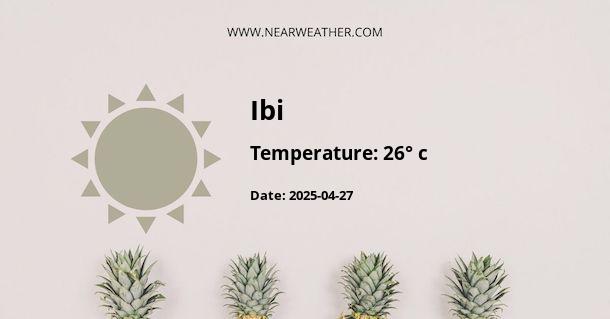Climate and Weather in Ibi, Nigeria
Ibi is a town located in Taraba State, Nigeria. It is situated in the northeastern part of the country and experiences a tropical climate influenced by the West African monsoon system. The town is characterized by distinct wet and dry seasons throughout the year, with variations in temperature and precipitation.
Temperature
Ibi experiences high temperatures all year round, typical of a tropical climate. The average annual temperature in Ibi is around 27 degrees Celsius (81 degrees Fahrenheit). The hottest months are usually February to April, with temperatures often exceeding 30 degrees Celsius (86 degrees Fahrenheit). The cooler months are from November to January, with average temperatures ranging from 24 to 26 degrees Celsius (75 to 79 degrees Fahrenheit).
The daily temperature variation in Ibi is relatively small, with only a few degrees difference between day and night. This is common in tropical climates where the proximity to the equator leads to less variation in sunlight throughout the year.
Precipitation
Ibi experiences a distinct wet and dry season, with the wet season lasting from April to October and the dry season occurring from November to March. The town receives an average annual rainfall of about 1,600 millimeters (63 inches).
The peak of the rainy season in Ibi is usually between June and September, during which heavy downpours and thunderstorms are common. The months of July and August receive the highest amount of rainfall, with an average of 300 to 400 millimeters (12 to 16 inches) per month.
During the dry season, Ibi experiences little to no rainfall, with clear skies and sunny weather. Humidity levels can be relatively low during this period, making it more comfortable for outdoor activities.
Climate Graph
The climate graph below illustrates the average monthly temperature and rainfall in Ibi throughout the year:

Seasonal Variation
The distinct wet and dry seasons in Ibi have a significant impact on the local environment and agricultural practices. During the wet season, the town's vegetation becomes lush and green, and farming activities thrive. The abundant rainfall supports the growth of crops such as corn, millet, and yams.
In contrast, the dry season poses challenges for agriculture as water sources become scarce, and irrigation becomes necessary for crop cultivation. Farmers often rely on stored water or nearby rivers for irrigation during this period.
Extreme Weather Events
Like many regions in Nigeria, Ibi is occasionally affected by extreme weather events. These events can include heavy rainfall leading to flooding, especially during the peak of the rainy season. It is important for the local community to have effective drainage systems and flood preparedness measures in place to mitigate the impact of such events.
Conclusion
Ibi, Nigeria, has a tropical climate characterized by a distinct wet and dry season. The town experiences high temperatures all year round, with the hottest months from February to April. The wet season lasts from April to October, with the peak of rainfall occurring in July and August. The dry season occurs from November to March, with little to no rainfall. These climate patterns influence the local environment and agricultural practices in Ibi.
A - Ibi's Latitude is 8.183330 & Longitude is 9.750000.
A - Weather in Ibi is 26° today.
A - Climate Conditions in Ibi shows overcast clouds today.
A - Humidity in Ibi is 67% today.
A - Wind speed in Ibi is 3.49 km/h, flowing at 268° wind direction. today.
